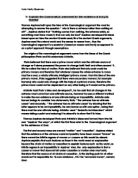Kant says that existence is not a predicate of God. Kant is known for his coin analogy. Essentially this analogy claims that 100 coins in your hand in comparison to picturing 100 coins in your hand BOTH have the same value: neither is greater. 100 coins is still 100 coins, no matter how you look at it.
Indeed, John Cardinal Newman agrees with Kant’s argument and says: “we feel responsibility, are ashamed, and are frightened at transgressing the vice of conscience, THIS implies that there is one to whom we are responsible”. For Newman, the existence of a conscience implies the existence of a moral law-giver to whom we answer to: God.
His argument is as follows: everyone has an innate sense of moral awareness, enabling us to understand obligation and virtuous acts. For example, it doesn’t matter what culture or history or circumstance we are talking about; actions like murder or rape are always bad. This shows the existence of an “objective moral law”.
This of course follows his ‘categorical imperative’, which states that there is an absolute and universal sense of moral duty within human beings which directs them towards the right actions. You make a moral decision based on a sense of duty, without any consideration or dependence on the outcome of that action.
This leads us to the three postulates of morality, these are the factors involved when achieving the Summum Bonum. The Summum Bonum is the supposed ‘reward’ you get for doing ones duty and achieving a state of complete happiness, to achieve this is the aim of all moral actions.
Kant said that duty is doing a good action for no other reason except that you should do it; it would be the right thing to do. His famous quote goes: “ought implies can” which tells us that we cannot let the consequences of actions interfere with our duty. Although, having said that, Kant did say that we can only have a duty to do something if were physically able to do so. For example, if ‘Alice’ was very unwell and her Nan phoned her up and asked her to visit, it would not be Alice’s duty to do so.
Rationally, perfect virtue ought to be rewarded with perfect happiness. However we know from experience that this is not always the case. Clearly this is not achieved in this lifetime, therefore we must presume that there is an afterlife, of which provides humans the opportunity to have immortality.
An ‘average’ level of virtue is not enough and we are obliged to aim for the highest standard possible. This however is only possible after a lifetime of fulfilling moral duties and we do not possess the power within ourselves to coincide both perfect happiness and moral perfection (achieve the Summum Bonum).
Therefore to conclude, it is clear within Kant’s moral argument that God must exist as a postulate of practical reason. For without the existence of God, we cannot have the afterlife and we would not be able to fufil our obligation of reaching the summum bonum. Therefore God is necessary to ensure fairness in the universe and provide us with perfect happiness. For who else is omnipotent and omni-benevolent to do such deed?



![Explain Kants Moral argument for the existence of God [Part A question]](https://mbt-essays-prod-public.s3.eu-west-1.amazonaws.com/1215651/listing/1215651_1.jpg)




